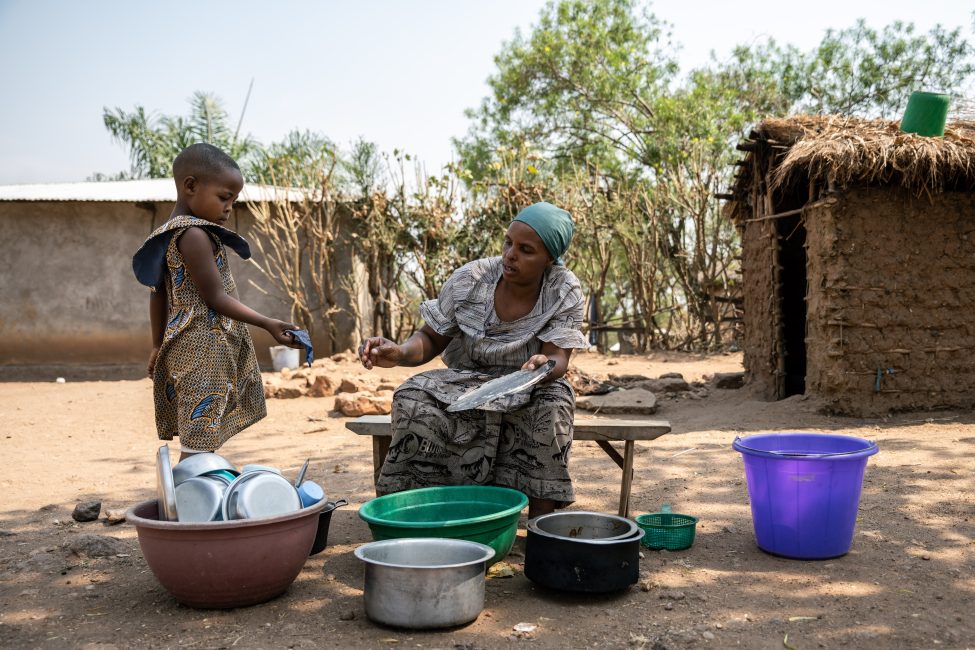“They burned our homes. That’s why we fled. I was pregnant and gave birth to my youngest child on the journey. All I had with me was a loincloth, which is what I used to cover my baby after the birth”, recalls Florence Nyabigondo Nyamajana, aged 40, who is originally from Bijombo in the highlands of Uvira. Each more traumatic than the last, the stories of the displaced people who have fled inter-ethnic violence in the highlands and uplands are upsettingly similar. Florence Nfurakazi, aged 24, also remembers the umpteenth attack that prompted her family to leave in April 2021, after more than three months of violence in the village of Katobo: “That time, the rebels came at night and killed some of our neighbours.”
To escape this fate, many families in South Kivu set out on a trek lasting several days, taking nothing with them except the clothes they were wearing and, at best, a few animals. By the end of September 2023, the number of internally displaced people in the DR Congo was more than 6.3 million, 677,000 of whom had been displaced since the beginning of the year. These people are among those worst hit by food insecurity, which affects 25 million Congolese people, or 1.5 million in South Kivu alone.
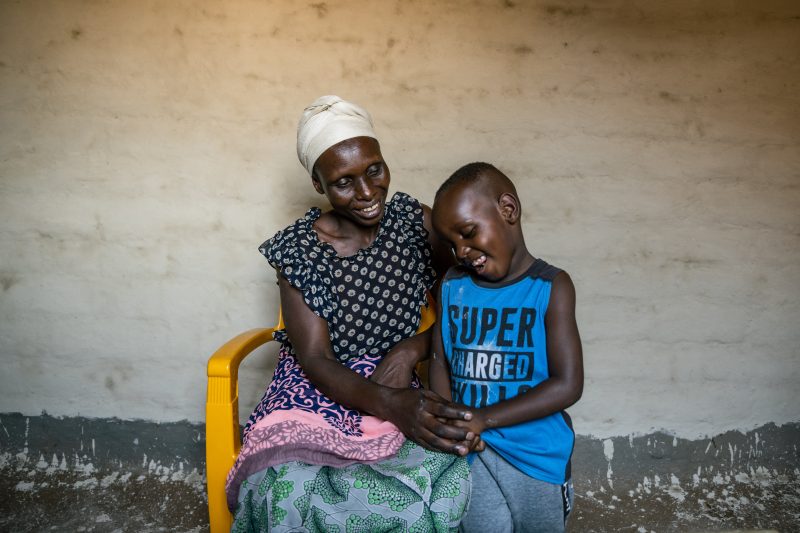
Florence Nyabigondo Nyamajana and her youngest son, whom she gave birth to on the way to Bwegera. © Arlette Bashizi
For the past two years, thousands of displaced people have been seeking refuge in the village of Bwegera. That is where Vétérinaires Sans Frontières Belgium set up a humanitarian aid project at the end of 2021. “When we arrived here, life was very difficult”, explains Francine Mukogba, a young nurse originally from Mulenge. “Imagine finding yourself in an unfamiliar place, without a penny to your name. You don’t even have any clothes… It was difficult, but thank God the population here welcomed us as we were, into their homes, and they shared with us the little that they had.”
Including host populations is the key to stimulating social cohesion
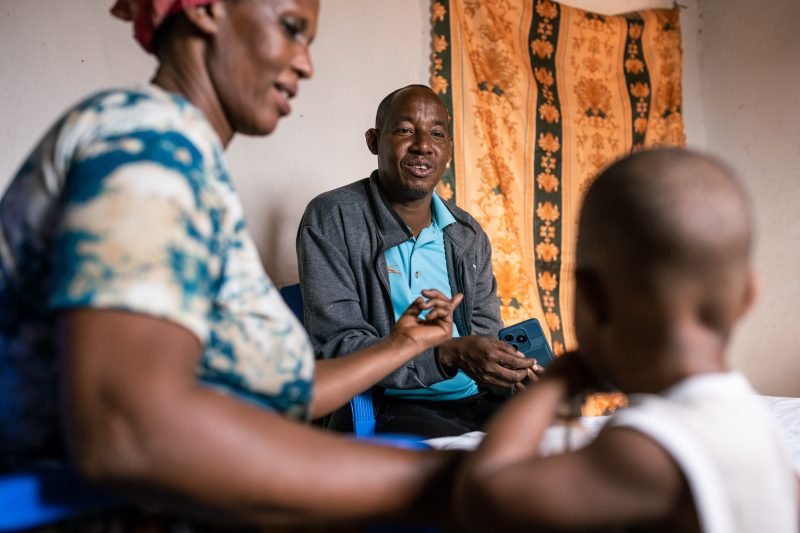
Faustin Mporana and his family have hosted five families of displaced people since the crisis began in April 2021. He praises Vétérinaires Sans Frontières Belgium’s efforts to promote social cohesion between the two communities. © Arlette Bashizi
Faustin Mporana, aged 47, is a livestock keeper born and bred in Bwegera. He remembers well how the first displaced people arrived en masse in his village. “We started welcoming displaced people in April 2021. We shared everything we had with them; I have had five families living with me.” But the influx was so great that after a few weeks, the local population began to feel the pressure too. Tensions started rising between the host and refugee communities. “We were helping so many families that we started to become vulnerable ourselves, because we had to share everything…”, Faustin continues.
In this context, the arrival of Vétérinaires Sans Frontières Belgium was welcomed enthusiastically by both communities: “We’re used to receiving help from NGOs here, but Vétérinaires Sans Frontières Belgium really made a difference, because they arrived just at the point when we were getting overwhelmed”, Faustin explains. “There were a lot of displaced people. Given the circumstances in which they fled their homes, with inter-ethnic conflicts, social cohesion training was extremely important. It has taught the two communities to live together.”
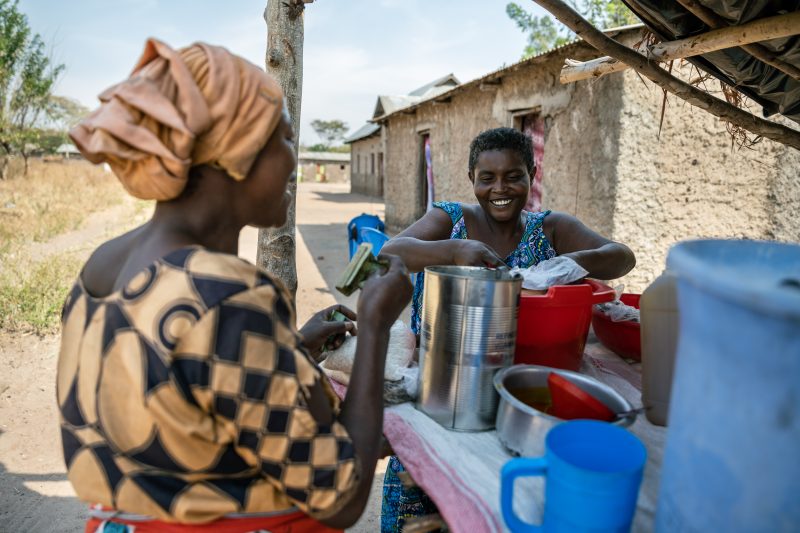
Charlotte Djedje, a member of the host community, has benefited from support from Vétérinaires Sans Frontières Belgium to energise her business. © Arlette Bashizi
In fact, Vétérinaires Sans Frontières Belgium focuses on social cohesion in all its aid programmes for refugees and displaced persons, as an essential building block for the other activities to support the populations. Although these activities prioritise the people who have been uprooted, the most vulnerable members of the host community are not forgotten. Charlotte Djedje, aged 34, has had a disability since birth, and as such she was able to benefit from several forms of support: “As hard as I tried, I just couldn’t manage on my own. My disability means that I can’t work in the fields. Now, thanks to the help from Vétérinaires Sans Frontières Belgium, I am working, and I feel valued by my community”, she explains between serving two customers at her little stall. “Before I received support, my children only ate one meal a day. Now they get two meals a day and I can send them to school without difficulty.”
Money and livestock to start again from scratch
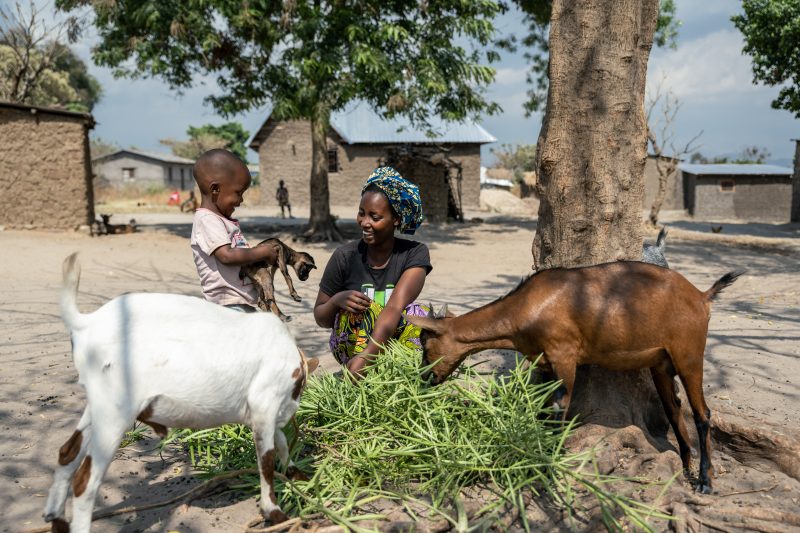
Florence Nfurakazi, aged 24, found refuge in Bwegera with her husband and two children. Vétérinaires Sans Frontières Belgium gave her three goats, one of which has recently had a kid. It is a way for this young mum, who owned a large herd before she had to leave her village, to start again from scratch. © Arlette Bashizi
To ensure that our support is as relevant as possible for our beneficiaries, we place a particular emphasis on two main aspects. Firstly, we offer financial aid in the form of a mobile transfer through the local operator Airtel. This secure system makes it possible to give families autonomy while supporting the local economy. The beneficiaries decide for themselves how to spend the money they receive: “It really helped us”, says Francine, who has received four instalments of 100 US dollars and a phone to receive them on since she arrived in Bwegera. “Although not everyone has received money, the ones who have buy things like food and share it with the others. It’s as if we were all receiving cash.”
Secondly, we help the families develop income-generating activities to enable them to make a long-term recovery. Since most of the population made a living from livestock keeping in Uvira territory, the activities our beneficiaries have chosen are very often in that area. In two years, 240 families have been able to choose whether to receive three pigs, three goats or a stock of foodstuffs and other non-food products to open a small shop.
Livestock keeping, a solid basis for a stable income
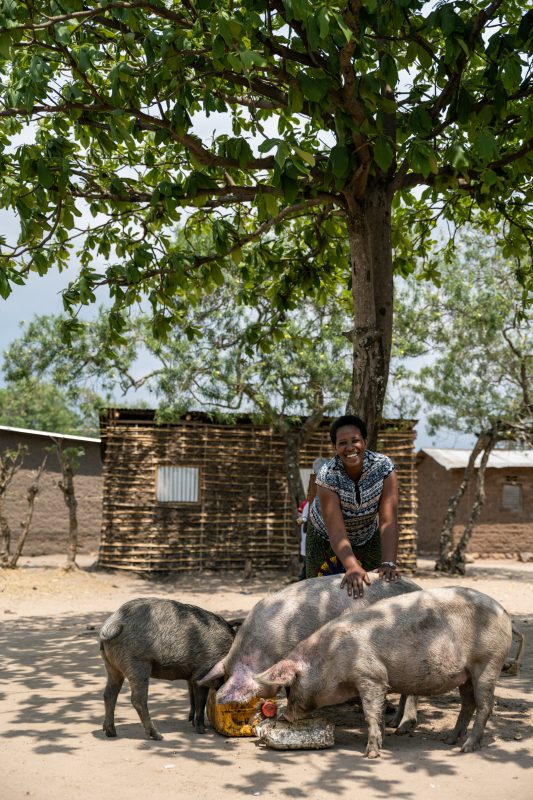
Francine and her three sows. © Arlette Bashizi
Francine opted for pig-keeping in combination with her work at Bwegera medical centre. She hopes that this will cover her children’s education: “I have received three sows, and I hope they will have litters soon. Just think, when the three of them have piglets, I’ll suddenly have almost thirty pigs! We also receive technical support from Vétérinaires Sans Frontières Belgium on how to take proper care of our animals. I’m learning how to care for them, what to feed them and so on. Life isn’t perfect yet, but this is a good start.”
Once a farmer and the owner of a livestock-keeping business with about thirty goats and twenty cows in her home village, Florence opted for goats: “A few days ago, one of my goats gave birth to a kid. My children were over the moon! They woke me up at four o’clock in the morning, saying, ‘Mum, wake up! The goat has had a baby!’ My second child, Irankunda, adores the baby goat. He says it’s his, that he’s going to raise it to be a big goat”, the young mother tells us with a smile. “This livestock is going to help us a lot. My goats will multiply until I can afford a cow. If we manage to make this livestock-keeping business work, I’ll be able to pay for my children’s education as well. I’d like them to be able to study in good conditions.”
Vétérinaires Sans Frontières Belgium has been working with livestock-keeping populations in the eastern DR Congo since 2007, through activities to support livestock keeping and animal health. Faced with a population in distress, we have also been implementing humanitarian activities in South Kivu since October 2021, with the support of the Belgian government (Directorate-General for Development Cooperation and Humanitarian Aid). These activities are part of a multi-country programme being carried out in the Sahel (Mali, Niger, Burkina Faso) and in the region of the Great Lakes (Uganda and DR Congo).

